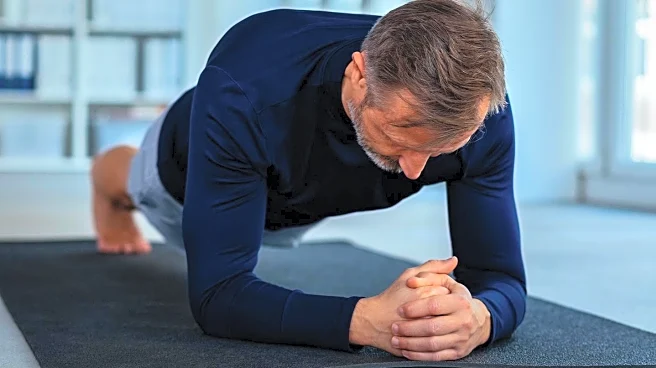What's Happening?
A fitness coach and certified personal trainer has incorporated the Copenhagen plank into her workout routine, emphasizing its benefits for core strength and stability. The Copenhagen plank, a side plank variation, engages multiple muscle groups including the abs, inner thighs, glutes, and stabilizer muscles. The coach, who trains five to six days a week, added this exercise to her regimen to challenge her body and mind. Over a month-long period, she noticed improvements in hip stability, knee discomfort, and overall core engagement during everyday movements. The exercise also contributed to better posture and mental resilience, providing a moment of mindfulness and stress relief.
Why It's Important?
The introduction of the Copenhagen plank into fitness routines highlights the importance of exercises that target multiple muscle groups for comprehensive strength building. This approach not only enhances physical performance but also supports mental well-being by fostering discipline and mindfulness. The coach's experience underscores the interconnectedness of muscle groups and the benefits of consistent, small actions in achieving significant fitness results. This exercise can be particularly beneficial for individuals seeking to improve balance, control, and core strength, which are essential for both athletic performance and daily activities.
What's Next?
The fitness coach plans to continue incorporating the Copenhagen plank into her routine, recommending it to her clients for its unique benefits. She intends to use it as a finisher in lower body and core training sessions, as well as during mobility-focused days. This exercise is expected to gain popularity among fitness enthusiasts looking for effective ways to enhance core strength and stability. As more individuals adopt this exercise, it may lead to broader discussions on the importance of functional training in fitness programs.
Beyond the Headlines
The Copenhagen plank's emphasis on mental focus and body awareness may inspire a shift towards more mindful exercise practices. This could lead to increased interest in workouts that not only build physical strength but also promote mental health and resilience. The exercise's ability to engage deep stabilizing muscles may also influence the development of new fitness routines that prioritize joint stability and injury prevention.










